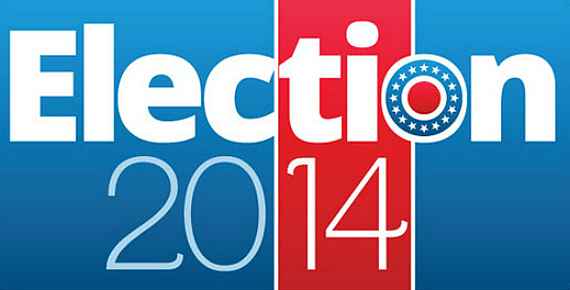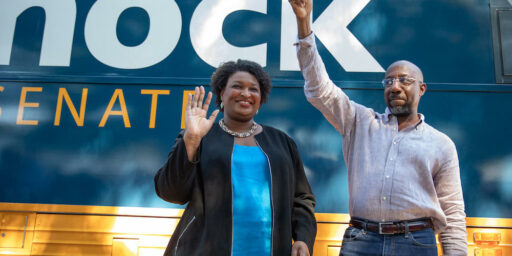Slipping Support Among Key Groups, And Obama’s Job Approval, Have Democrats Worried
Important numbers in recent polling suggest big problems for Democrats on Tuesday.
A new poll from Harvard University of voters aged 18 to 29 contains some worrisome news for Democrats:
A new national poll of America’s 18- to 29- year-olds by Harvard’s Institute of Politics (IOP), located at the John F. Kennedy School of Government, finds slightly more than half (51%) of young Americans who say they will “definitely be voting” in November prefer a Republican-run Congress with 47 percent favoring Democrat control – a significant departure from IOP polling findings before the last midterm elections (Sept. 2010 – 55%: prefer Democrat control; 43%: prefer Republican control). The cohort – 26% of whom report they will “definitely” vote in the midterms – appear up-for-grabs to both political parties and could be a critical swing vote in many races in November.
(…)
The KnowledgePanel® survey of 2,029 18- to 29- year-old U.S. citizens with a margin of error of +/- 2.6 percentage points (95% confidence level) conducted with the Government and Academic Research team of GfK for the IOP between September 26 and October 9 finds:
While more 18- to 29- year-olds (50%-43%) surveyed in the IOP’s fall 2014 poll would prefer that Congress be controlled by Democrats instead of Republicans, the numbers improve dramatically for the GOP when only young people who say they will “definitely vote” are studied. Among these likely voters, the IOP’s latest poll shows the preference shifting, with slightly more than half (51%) preferring a Republican-run Congress and 47 percent wanting Democrats to be in charge – a significant change from the IOP’s last midterm election poll in the fall of 2010 when Democratic control was preferred among likely voters 55 percent to 43 percent.
Overall, President Obama’s job performance among America’s 18-29 year-olds has fallen from 47% (April 2014) to 43 percent (53%: disapprove), the second-lowest rating in the IOP polls since he took office (41%: November 2013). Among 18-29 year-olds saying they will “definitely be voting in November,” the president’s job approval rating is 42 percent, with 56% saying they disapprove.
And, much like the rest of the public, respondents who are more conservative are more enthusiastic about voting next week, and more likely to go out to the polls to do so:
Roughly one-in-four (26%) young Americans under the age of 30 say that they will “definitely be voting” in the fall, a very similar proportion to that seen during a similar time period prior to the 2010 midterm elections (27%: Sept. 2010). Further, compared to the last midterm election of 2010, traditional Republican constituencies seem to be showing more enthusiasm than Democratic ones for participating in the upcoming midterm elections and are statistically more likely to say they will “definitely be voting.” By a significant 12-point margin, 42 percent to 30 percent, a greater proportion of young Republicans say they are definitely going to vote in November than young Democrats, a wider margin that seen in Sept. 2010 IOP polling (38%: Republicans “definitely” voting; 33%: Democrats “definitely” voting). Others who are more likely to participate than their counterparts include: college students (31% say they will definitely vote), college graduates (40%), males (31%), Romney voters (57%), Whites (29%) and African-Americans (28%) compared to Hispanics (17%).
As Politico notes, when you read deeper into the poll you find that millennials, like most Americans, are frustrated with and dismissive of both parties, but the fact that we’re seeing the same lack of enthusiasm among younger voters who might be inclined to vote for Democrats that we’re seeing in the American public as a whole is something that ought to concern Democrats heading into Tuesday. As I’ve noted before, midterm electorates tend to favor Republicans to begin with, although as 2006 showed us that doesn’t mean that Democrats can’t succeed under the right circumstances. A midterm election where the voters most likely to vote Democratic end up staying home, however is one that could lay the ground for the kind of perfect storm that tips marginal races into the Republican column, thus making what might have been a small ripple something bigger. It might not necessarily be a “wave,” in fact I agree with the analysts who find the idea of a wave election this year unlikely, but it wouldn’t take a wave to push the Senate into the Republican column with a 51-49, 52-48, or even 53-47 Republican majority. Given the fact that the GOP will have to face a perfect storm of its own when its defends whatever majority it might win this year in 2016, that difference of one or two seats could end up being the difference not only for the 114th Congress, but also for the 115th Congress that will sit in 2017 when the next President takes office.
Another poll released this week shows that Democrats have slipped among another key demographic group in their coalition:
This number jumped out at me from the new Washington Post/ABC News poll: It showed that, among Latinos, 50 percent say it doesn’t matter who wins the Senate come November. And among those who do think it will matter, twice as many say it would be a good thing (30 percent) if the GOP took over as say it would be a bad thing (15 percent).
This is a demographic, we will remind you, that voted 71-27 for President Obama just two years ago. And only 15 percent are concerned about a GOP-controlled Senate.
While there is a fairly big margin of error (plus/minus 10 points) in this sub-sample, those are still striking numbers — and they comport nicely with the idea of Hispanics’ declining faith in the Democratic Party. And if you can’t get voters to believe something will change, it’s hard to make a convincing case to get them to vote.
And there are also doubts about the reliability of single women, another typically Democratic demographic:
One of the most interesting numbers in the new Washington Post-ABC News poll is buried deep within the cross tabs.
The poll shows that, on the generic ballot, the GOP leads 50-44 among all likely voters. But among unmarried women, Democrats have a 48-43 edge.
That might seem to be a good thing for Democrats, except that they count on single women in a much bigger way — in fact, so much so that this demographic is routinely highlighted as the key to Democrats keeping the Senate.
“To Hold Senate, Democrats Rely on Single Women,” wrote the New York Times in July. The group Women’s Voices Women Vote Action Fund commissioned a poll from a Democratic pollster around the same time and headlined it, “New Poll: Unmarried Women Voters Could Make the Difference in Senate Battleground States. Then, when the support for Democrats among single women in that same poll doubled, Real Clear Politics reported, “Unmarried Women Fuel Pollster’s Optimism for Dems.”
(…)
Of course, we shouldn’t read too much into one poll, and breaking out small sub-samples (this poll interviews 228 registered unmarried woman voters and 151 who are considered “likely” to vote on Nov. 4) results in high margins of error. The idea that unmarried women will only favor Democrats by five points next week is probably far-fetched, and the margin of error means that five-point margin could be significantly higher.
Indeed, recent polls from AP-GfK and the Pew Research Center show unmarried women favoring Democrats by 14 and 20 points, respectively. And the Democratic pollster referenced above, Democracy Corps, showed the gap at 22 points.
But all four of these polls still show smaller margins than have exited over the last four elections. In other words, all of these polls show this group is a precarious one for Democrats, though none of them indicate women will definitely favor Democrats by less than in recent races.
In addition, the WaPo-ABC poll suggests this group is really not that interested in the election, with 58 percent of registered single women voters following it very closely. That’s lower than every demographic tested except one — unmarried men (57 percent).
If these numbers are close to accurate, they’re a troubling development for Democrats, who have spent much of the past two years emphasizing the GOP’s so-called “war on women” for the purpose of turning out this particular demographic.
All of this has Democrats worried about the nation political environment with just five days of campaigning left:
Prominent Democratic strategists are growing increasingly nervous that the national political environment is not only bad for their side but is moving in the wrong direction in the final days before the election, a trend that could not only cost them control of the Senate but also visit double-digit House losses on the party.
“The environment has settled and it’s bad,” said one senior Democratic party operative closely monitoring the party’s prospects this fall. The source added that Democratic candidates’ numbers among independents and seniors — two critically important voting blocs — have begun to erode; “they are just not as friendly to us as they once were,” the source explained.
In conversations Wednesday with more than a dozen Democratic strategists deeply involved in this campaign — a few who were willing to speak on the record, a majority who were not — there was a widespread pessimism about the party’s chances Nov. 4. ”Challenging,” acknowledged Ali Lapp, executive director of the House Majority PAC, a super PAC spending millions on ads to promote House Democrats. “It’s a very challenging environment,” agreed Penny Lee, a Democratic lobbyist and longtime political aide to former Pennsylvania Gov. Ed Rendell. “Unsettled,” offered Democratic pollster Fred Yang. “The trends are not good,” said Steve Rosenthal, the veteran Democratic and labor strategist.
There were lots (and lots) of reasons given for the difficulties facing Democrats. The Senate map. The historic trends of second term, midterm elections — aka the “six-year itch.” Voter apathy. But the one factor that virtually every person I talked to cited as the biggest reason for the party’s current predicament was President Obama.
“This off-year election has become almost entirely a referendum on the president,” said one Democratic consultant involved in a number of closely-fought congressional races. “It’s not just anger at [the Affordable Care Act]. He has become, in my opinion wrongly, the symbol of dysfunction in Washington. That has led to a demoralized Democratic base, energized Republicans and those in the middle have an easy way of venting their frustration, and that is to punish the president’s party.”
“It is not ALL Obama but a lot of it is,” said another Democratic strategist knee-deep in the 2014 midterms and granted anonymity to speak candidly. “[People] are very upset with government and people think Democrats are in charge, so they are taking it out on Democrats more than Republicans.”
Asked for a single word to describe why this election was looking increasingly bleak for Democrats, one consultant offered “Obama.”
While I don’t think you can say that President Obama is the sole reason that Democrats are having problems this year, it certainly has to be a big part of that problem. Across the board — overall, and on issues such as the economy and foreign policy — the President’s job approval numbers are at or near historical lows and have been stuck there for most of the election cycle. This, combined with the fact that Democrats are defending incumbents and open seats held by Democrats in seats that have gone Republican in, with the exception of North Carolina which Obama won narrowly in 2008, every election since at least 2000 and it’s rather obvious that the President is a problem for them. This is why you don’t see Democratic candidates in those races aligning themselves with the President, asking him to campaign for or with them, or in some cases even willing to admit they voted for him even when its blindingly obvious that they did. Combine this with the fact that the demographic groups that are most likely to vote Democratic appear likely to stay home and things could be shaping up badly for Democrats come Tuesday and Tuesday evening when the results are announced.
As always, of course, it’s the voting the actually matters so we’ll see how things turn out.







Even as a political junkie, these stories are getting boooring. Wake me up when it’s over, and the real fireworks begin.
Yeah, we get it Doug, Republicans are poised to retake the Senate. You’ve convinced me already. Now, deeper analysis would focus on WHY support has dropped and what has happened since 2012 for that to happen.Let’s start that debate. It’s no longer debateable thhat support has dropped and that the Republicans are poised to benefit from that. You’re repeating yoursellf now.
Here’s a hint as to why support dropped:
Hey, right wing propoganda works!
Michael Tomasky put it best…how could Democrats be losing to these idiots?
Anyway….let’s get past this week…then we can focus on how Republicans are going to fwck things up.
@stonetools: Democratic support has dropped because Democrats deserve to lose. Unfortunately the only alternatives are to vote for Republicans who don’t deserve to win, cast a third party protest vote, or stay home.
@Ben Wolf:
Well, let’s start that debate. What could Democrats have done different? And please, no magic Green Lantern scenarios where Obama could have pressed a button on his desk and caused the economy to boom.
I agree with you, BTW, that the key is that the economy could have been boosted through fiscal stimulus. But the Republicans astutely blocked that from happening, and are reaping the rewards of their sabotage campaign.
@stonetools: Obama never voiced support for a larger stimulus and was taking economic advice from a man with no identifiable knowledge of macroeconomics. He was the first Democratic president to propose cuts to Social Security and is still seeking a Grand Betrayal of American seniors (Republicans in multiple states are now attacking the Democratic candidates for attempting these cuts, who could have thunk it?) He made no effort on behalf of single-payer or even a public option despite campaigning on the issue. His Justice Department declined to prosecute a single torturer or bank executive involved in systemic fraud. His administration promised Congress that TARP funds would be used primarily for assisting families in distress and instead directed them at banks to “foam the runway” for their soft landing. He has run an administration as secretive as Nixon’s after promising the most transparent in history. Card Check, the DREAM Act, mininium wages: here as “planks” in the party platform in one news-cycle and gone the next. He has refused to stand his ground against Republicans on any policy, sending his base the very clear message he is totally unwilling to fight for them.
The Democrats threw their lot in with the corporate-controlled wing of the party; now they pay the price of being beaten by a group so destestable that very few are even willing to associate with it any more.
@stonetools:
Not aided the expansion of a gigantic surveillance regime, for starters. Not cracked down on government whistleblowers with the intensity they have. Reined in the drones. (Not stopped them, but subjected their missions to greater scrutiny maybe?) Prosecuted the torturers, or failing that, not pull out every damn stop to censor the torture report.
There’s just a huge laundry list of things the Democrats could have done differently that didn’t require passing laws through a recalcitrant Congress, and they chose not to do them. Obama could have used the bully pulpit more to engage the public of any of these issues, but chose not to. When you campaign on Hope and Change, you have to actually change more than just healthcare.
Obama isn’t doing well because he made a lot of empty promises (that doesn’t necessarily mean the people who voted for him are voting for the republican nominee-they may stay home or choose a third party).
Obama is losing because most people aren’t feing any recovery. once again this doesn’t necessarily translate to a GOO vote but it may strengthen the GOPs chances because that voter is not a likely voter or won’t vote for the democrat.
The GOP base and learners were already voting for GOP candidates-Obama’s problem is that many of the people who turned out to vote for him in droves aren’t doing that this time. They’re voting GOP, voting third party or staying home.
40,000 extra votes in Georgia would help
Well, as Michael Reynolds will tell you, if you are not a die hard supporter of Obama you are a racist. So there you have it, the country is just a bunch of racists, especially those Dem candidates who prefer Obama stay away…………….very far away.
@stonetools: I saw the same thing during my last trip to visit my mom (87 y.o. and gets all her “important” news from Fox and two guys on Trinity Broadcasting Network) when she lamented that she wished that Obama had not started the war in Iraq that has led to all of the trouble with ISIS.
@stonetools: quid pro quo- democrats “thought” bush steered katrina their way and blamed him for their own stupidity. they were thankful that the great state of Texas took them in as their own- and @Guarneri: they sure in hell don’t want to go back now!
Before we consider tactics, let’s consider fundamentals, like historical context.
This, from PBS Newshour:
Looking at the historical data, a six or seven seat Senate loss for a sixth year Presidency looks almost inevitable. Note that in 1986, Saint Ronaldus himself(blessed be His Holy Name/s) took an eight Senate seat loss. So the projected losses this cycle are in line with the historical data.
That said, tactically, the Dems should not be losing in Iowa and Colorado-purple states where Obama won twice. I think the candidates there ran poor campaigns. But the big picture is that Democrats are doing about as badly as expected.
@Ben Wolf:
I’ve often attacked conservatives for posting from a paralell universe where conservative ideas actually worked. However, certain liberals do seem to inhabit a paralell universe of their own, in which the President has a magical power to compel hard core conservatives to change theire votes through the so called Bully Pulpit, or maybe just through sheer force of of will. Unfortunately, Liberal Fantasyland is just as unreal as Conservative Fantasyland.
I followed the health care debate very closely, and I’m convinced that single payer was simply never a possibility, and that the public option was similarly out of reach. Even if these had passed, I think it very unlikely that Roberts would have provided a fifth vote to save the ACA in the Supreme Court in 2012 had it be single payer or included a public option. The depth and fury of the opposition to the current ACA has convinced me that we are lucky to pass the ACA at all. The good thing is that the ACA is working well, and I expect that by 2016 it will be a plus for the Democrats.
As to the stimulus, this guy has argued that the votes were simply not there for a big Krugman style stimulus. We liberals like to demonstrate cthat we are right, and then assume that we can carry the day through the magic of our logic. In reality, entrenched power and Senatorial chokepoints can checkmate logic. That said, I do thibnk Obama should have advocated strongly for a bigger stimulus and blamed Republican obstructionism for the weakness of the recovery. But that’s hindsight, which is of course useless. Obama played a tough hand as best as he could. Agree he went much too easy on the banks.
@Tillman:
Everyone has their list of pet issues that they deem crucial. The reality is that everone’s list of issues is different, and there is only a finite amount of time, resources and political capital to spend on each issue. Are your issues more important than the issues the Administration did address ( averting a Great Depression 2, saving the auto industry, passing HCR, advancing gay rights, trying to protect voting rights?). Honestly, I think the Adminstration focussed on the right things.
I know that some pundits now believe that there is a strong possibility that the GOP gets to 52-53 in the Senate.
All I can say is the voters get what they deserve. Congressional Republicans have twice shut down the federal government in 5 years, and they were seriously attempting to leverage the threat of default to force the president to rescind, repeal, or de-fund ACA. There is no such thing as an ongoing “wisdom of The People,” it comes and goes, and right now it looks like it’s on vacation or sick leave.
@stonetools: Also, many liberals mistakenly believe that the lack of single-payer was something peculiar to Obama. In fact, single-payer hasn’t been on the table in Democratic politics for over a generation. Clinton’s 1993 plan wasn’t single-payer. None of the three leading Democratic candidates in 2008–not Obama, not Hillary, not even lefty-favorite John Edwards–backed single-payer. Krugman at the time advocated health-care reform very similar to the plans being pushed by Obama and Edwards. He always maintained that single-payer was ideal, but he felt that this compromise was the most progressive goal that had a chance of passing our political system, even under strong Democratic majorities. (Krugman’s a bit of a curiosity, since he’s always been politically pragmatic when it comes to health care but is capable engaging in green-lanternism on other issues. The stimulus he favored probably was no more politically realistic than single-payer, but he blamed Obama for failing to get it through.) It’s true that Obama’s 2008 plan included a public option, something he ultimately scrapped from the bill, but (1) it’s very possible he didn’t have enough votes to pass it, and pushing too hard on the issue could have sabotaged the entire bill; considering how close it came to not being passed at all, that’s not an irrational fear (2) the public option was never as central to the bill as many liberals believed; the plan always depended mostly on private insurance companies to expand coverage. I think the bill would have been better with a public option than without one, but it was never some grand liberal dream even in its original form.
@stonetools:
All but the last of Tillman’s list were things the administration actively pursued, not things they neglected.
@stonetools: I didn’t write an enraged comment demanding the president pass single-payer, or lock up every banker and torturer, or convert some conservative fool into a supporter of a competent stimulus bill. What I wanted from him was an effort to try and do the right things even though I was aware he wasn’t the man he campaigned as.
But at no point did the president go to war on behalf of the people who elected him. Even with an obstructionist House most Americans would have responded eagerly to barnstorming on his part. The president ignored his most knowledgable advisors on a stimulus bill and never, to anyone’s knowledge, attempted to do it right. They simply came up with a number they thought was politically expedient and wouldn’t make Geithner pout; even then the Republicans didn’t support it.
We know the president never devoted resources to crafting a single-payer proposal and abandoned the public option almost immediately. Instead we got national Romney-care, a bailout program for a rentier insurance industry, and even that he gave up on. It was entirely due to Reid and Pelosi the PPACA came to a vote after the president washed his hands in an all-too common moment of, “eh, fuxk it”.
This has been the most cynical presidency of my lifetime. Is it fair to expect anything else from Obama? Probably not as that’s who he is and the universe doesn’t orient itself around my preferences, but this country was ready for a major turn and it was an opportunity that likely won’t present itself again any time soon.
It needed candidate Obama. It got President Obama.
Democrats will keep the Senate and retake the House due to the popular National conversation on Guns.
That will provide a mandate to pass the a gun registry and various gun bans.
Why wouldn’t Alaska easily reelect Senator Mark Begich considering the last Republican to hold that seat was convicted Felon Ted Stevens.
@Paul L.:
How many times are you going to post that same comment. It wasn’t particularly clever or funny the first time and repetition isn’t making it more clever or more funny.
@Grewgills:
It is not trying to be clever or funny, just repeating the talking point from after Newtown.
Just wanted to remind progressives that Senator Ted Stevens lost to Mark Begich for being a convicted Felon .
Ah, yes, the endless ability of the bully pulpit to not only influence the public but change the voting tendencies of Congress members. Never mind that there is absolutely zero evidence that this strategy has ever worked.
@stonetools: sour grapes=bad whine.
@stonetools: You know what your problem is? Three out of five things you noted as great achievements of the Obama administration made at the expense of the things I listed (averting a Great Depression 2, saving the auto industry, passing HCR) were done in the first two years of his presidency.
I’d quarrel over “advancing gay rights” as something the executive branch did, and “trying to protect voting rights” is ongoing. As is the surveillance regime, drone wars, crackdown on whistleblowers, and censure of the torture report. The funny thing about what I listed, and this deserves distinction, is that all of it was subject to executive branch discretion. Next to none of it required Congressional approval to change the course of. Normally the excuse is that once 2010 flew by and the Republicans got their obstructionism hard-on going, nothing could get done. It’s a very good excuse, and it excuses a lot of things. But those things aren’t what I pointed out.
The voters the Democrats would hope to count on in a midterm election see the administration improving healthcare with one hand and spying on them with the other. One hand defends voting rights while the other defends secrecy over torture. You can’t blame them for being unenthusiastic.